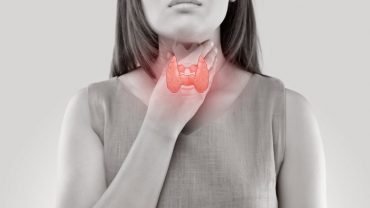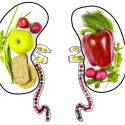16 Science-Backed Benefits of Vitamin B1 (Thiamine)
What is Vitamin B1?
You might be asking yourself, “What is thiamine?”
To answer this question, Vitamin B1, which is commonly referred to as thiamine or thiamin, is a water-soluble B vitamin that can be found in different food sources (1).
It can also be added to food products, or taken as a nutritional supplement.
Your body needs Vitamin B1 in order to maintain a healthy metabolism, which ensures that cells throughout your body are able to grow and work properly.
When thiamine is ingested via supplements or from food, it is absorbed by means of active transport into the small intestine.
If taken at a pharmacological dosage level, B1 is absorbed through the process of passive diffusion across a cell membrane.
Once absorbed, this coenzyme is used to metabolize food into energy, thereby turning the nutrients from foods and/or supplements your body has digested into a usable form of energy known as adenosine triphosphate (ATP). ATP is a cell’s energy currency (2).
Thiamine is necessary for numerous bodily functions to occur.
It helps us maintain a healthy metabolic rate and feel energized throughout the day. It also works in conjunction with other B vitamins to support positive mental health.
Since it is part of the B vitamin family, it is often found as part of a B vitamin complex supplement.
The other B vitamins (B2/riboflavin, B3/niacin, B5/pantothenic acid, B6, B9/folate, and B12) are generally included as well, as they all work to benefit mental and physical health.
You might be wondering why, if thiamine is present in food sources, you should even consider adding more to your diet.
While you might not have a severe B1 deficiency, chances are that you could be somewhat deficient.
Some studies have linked thiamine deficiency with psychological and cardiovascular stress in populations of young adults (3).
Further studies have shown that multiple vitamin B deficiencies can result in polyneuropathy.
Thankfully, there are plenty of food sources and supplements available on the market that can address a vitamin B1 deficiency.
Understanding B1’s benefits and how to find the best sources for it is important, especially as your body ages.
Signs of Vitamin B1 Deficiency
Now that you have the answer to “What is thiamine?”, it is time to discuss what a lack of thiamine in the body looks and feels like.
A wide array of symptoms, ranging from mild to severe, are associated with thiamine deficiency.
Those who are deficient in B1 tend to experience symptoms like chronic fatigue, muscle weakness, nerve damage, and even psychosis.
The longer a deficiency of thiamine goes untreated, the worse and more persistent these symptoms can become.
In fact, if they become severe, they can majorly disrupt your quality of life.
While thiamine deficiencies are not as common in developed countries (like the United States) as they are in countries where food sources containing B1 are scarce, they do occur in adults of various ages across the globe.
When a deficiency is detected or might be present, doctors generally recommend a daily dosage of 1.1 mg for women and 1.2 mg for men (4).
Depending on the severity of symptoms, the dosage could be slightly smaller or larger.
So, how can you really tell if you are B1 deficient? Here are the most common symptoms to look for:
- Excessive and rapid weight loss (including anorexia nervosa)
- Colitis
- Gastrointestinal issues (including diarrhea)
- A very small appetite
- Neuritis (inflammation of the nerves)
- Nerve damage
- Chronic fatigue
- Irritable mood
- Feeling confused
- Experiencing short-term memory loss, or difficulty processing new information into short-term memory
- Becoming increasingly depressed or apathetic
- Weakening of the muscles
- Cardiovascular issues (which can include an enlargement of the heart)
Beriberi is a disorder that can result from an extreme deficiency in B1.
In countries like Laos, Beriberi is often the result of dietary deficiencies.
This can be due to the excessive consumption of foods like white wheat flour or polished or decorticated rice (5).
In more industrialized countries like the United States, there are an increasing number of cases of Wernicke-Korsakoff syndrome being noted by doctors.
Wernicke-Korsakoff is most commonly found in alcoholics, and was even written about by Oliver Sacks in his book, The Man Who Mistook His Wife for a Hat.
Wernicke-Korsakoff includes symptoms of Wernicke’s encephalopathy (a depletion of B vitamins that negatively impacts the central nervous system) and Korsakoff’s syndrome (a decline in memory abilities among alcoholics).
Alcoholics with Wernicke-Korsakoff syndrome tend to eat very little and, therefore, suffer from a major lack of nutrients, especially those that come predominantly from food like thiamine.
Beriberi and Wernicke-Korsakoff syndrome are the most serious forms of B1 deficiency, but you can be deficient without knowing it.
The best way to know for sure is to speak with your doctor about getting lab tests done. Your doctor will need to measure the amount of transketolase (an enzyme that requires magnesium and thiamine to operate) in your bloodstream.
If you are thiamine-deficient, your body will not produce enough of this enzyme.
16 Health Benefits of Vitamin B1
Keeps Nerve Damage at Bay
One of the biggest vitamin B1 benefits is that it prevents nerve damage.
If you are deficient in thiamine, you are greatly at risk for developing nerve damage.
Nerve damage is life-interrupting and serious.
Your body needs thiamine in order to oxidize consumed sugar through a process known as pyruvate dehydrogenase (7).
If you are not getting enough energy through the consumption and digestion of food, your nervous system will become damaged.
Nerve cells need vitamin B1 to help protect the myelin sheath (a thin layer of coating that shields the nerve cell).
If the myelin sheath is damaged and the nerve cell underneath gets destroyed, a loss of memory, movement, and learning abilities can result.
Ensures a Healthy Metabolism
Vitamin B1 is essential for maintaining a healthy metabolism.
It creates ATP in your body, and aids in the body’s breakdown of fats and proteins (8).
Your body needs to distribute the thiamine you ingest from food through your plasma and bloodstream.
Not only does this keep you in shape, it helps to distribute oxygen evenly throughout your body to its various tissues.
As you get older, your metabolism starts to slow down, which can lead to weight gain, cracks on the heels of your feet, cellulite development throughout the body, and, most alarmingly, massive amounts of hair loss.
Having enough energy and oxygen distributed to tissues throughout your body prevents all of these issues from occurring, and ultimately gives you more energy to get through the day.
It certainly helps with getting through rigorous workouts, too!
Enhances Your Immune System
When you were younger, you might not have paid too much attention to your body’s immune system.
If you got sick with a cold or the flu, you might have gotten over it pretty easily.
As you get older and your body’s processes start to slow down, getting over an illness can become a bit more of a challenge.
If you are someone who has an autoimmune disease (and vitamin B deficiencies are extremely common among those with autoimmune diseases), you will struggle even more than the average person your age to maintain a healthy immune system.
Those with autoimmune diseases and thyroid issues often experience chronic fatigue or “brain fog” (a lack of mental clarity).
Some doctors and researchers believe that this is inextricably linked to a B1 deficiency.
Additionally, since those with these illnesses tend to experience simultaneously gut permeability (in other words, the digestive tract becomes less able to absorb and digest nutrients over time), the immune system is negatively impacted overall.
The body isn’t able to extract nutrients and use them to boost energy levels.
Since thiamine is responsible for secreting hydrochloric acid (which aids in digestion and absorption), it is imperative that you supplement with B1 if you have an autoimmune or thyroid-related disease.
Promotes Cardiovascular Health
Your entire cardiovascular system relies on thiamine to run efficiently and remain healthy.
Your body needs to be able to produce a neurotransmitter called acetylcholine (9).
This neurotransmitter is found throughout the central nervous system, and is the messenger that relays data between the nerves and muscles, especially the heart muscle.
One study has found that thiamine-deficient laboratory rats experienced a 60-percent decrease in acetylcholine synthesis and various neurological symptoms over the course of two months (10).
Essentially, with a deficiency of vitamin B1, the nerves and muscles are not able to communicate effectively and efficiently.
This can potentially cause irregularities in the heart’s rhythm.
Additionally, studies have found that supplementation with thiamine helps to combat heart disease and heart failure.
B1 aids in keeping the heart’s ventricles working properly, and is therefore crucial for maintaining heart health as we age.
Prevents Neurological Disorders
The longer your brain goes without a sufficient supply of thiamine, the more likely it is that you will develop lesions on the cerebellum (12).
This is especially common among those who are alcoholics, as well as individuals who are diagnosed with AIDs or cancer.
This might also true for those who have autoimmune diseases.
Anyone who is thiamine deficient will likely develop cognitive impairments (especially memory loss) as time goes on and the deficiency remains untreated.
Individuals who have been in a coma tend also to be deficient in vitamin B1, and require supplementation as they are coming out of it.
When doctors detect a B1 deficiency in their patients, they tend to prescribe high dosages to help combat memory loss and cerebellar damage.
Additionally, multiple studies have shown that there is a link between being thiamine deficient and developing Alzheimer’s disease (AD).
While the elderly tend to struggle the most with absorbing B1 supplements, getting enough thiamine at a younger age could potentially prevent some of the devastating effects that AD has on older adults (13).
Treats Symptoms of Alcoholism
Since alcoholics are exponentially more likely to develop Wernicke-Korsakoff syndrome, it is imperative that part of their rehabilitation process include getting enough thiamine.
Symptoms of Wernicke-Korsakoff syndrome include feeling extremely lethargic, having a difficult time walking, experiencing nerve damage, and having muscles move involuntarily.
These symptoms are life-altering, intense, and difficult (if not impossible) to recover from.
Wernicke-Korsakoff syndrome is most commonly found in alcoholics who have a very poor diet.
Since the body does not make thiamine on its own, it is entirely reliant upon receiving B1 through food sources.
When an alcoholic becomes deprived of thiamine-rich foods, they will develop Wernicke’s Encephalopathy (WE).
Wernicke’s Encephalopathy is extremely serious, but tends to be short-lived. However, about 80 to 90 percent of those who have WE will develop Korsakoff’s psychosis (14).
They struggle the most with processing new information into the brain, but also experience a severe drop-out of data that has been stored in the long-term memory.
Taking thiamine might not completely cure these symptoms, but it seemingly has the potential to prevent them from worsening over time.
However, the alcoholic’s body does have difficulty with taking up thiamine from the gastrointestinal tract, so an elevated dosage will likely be recommended for a patient with alcoholism.
Enhances Your Mood
We are all prone to experiencing less-than-pleasant moods.
Those of us with autoimmune diseases and/or mental health issues tend to struggle with elements of mood disorders.
When monoamine neurotransmitters in the brain (namely, serotonin, norepinephrine, and dopamine) fail to work properly, mood disorders can be the result.
A lack of vitamin B1, in addition to other nutritional deficiencies, can further exacerbate mood-related issues. (15)
Some recent studies have shown that thiamine supplementation might actually be a great way to improve your mood.
Essentially, what thiamine does is provide your body and mind with a way to cope with physical and mental stress. (This has actually earned the entire group of B vitamins the title of “anti-stress vitamins”!)
When you are B1 deficient, you will feel sluggish due to the fact that your body requires thiamine to create energy.
With that sluggishness comes a lack of motivation, as well as a lowered mood. Depression and anxiety have been linked to B1 deficiency.
Therefore, if you have a history of depression, anxiety, and/or chronic fatigue, you could potentially benefit from getting more thiamine in your diet.
Promotes a Better Attention Span, Learning, and Memory
We know for a fact that a deficiency in thiamine negatively impacts the cerebellum.
The cerebellum is an anterior (or rear) region of the brain that is responsible for a wide variety of functions, including motor control and balance.
It also plays a key role in certain cognitive functions, such as attention, fear regulation, language, and procedural memories.
These procedural memories are your “knowing how” memories of skills you learned a long time ago that, after repetition over time, have become unconscious.
Think of the “it’s like riding a bike” idea; you might not have performed this skill for years, but your muscles already remember what they need to do to perform this function successfully.
This type of memory is sometimes referred to as implicit memory, since it is something that becomes second nature.
A B1 deficiency can cause drop-outs of data from your cerebellum’s procedural memory storage.
This is most commonly seen in alcoholics, whose motor memory suffers, the more damage that is done to the cerebellum.
This can, however, occur in those with serious thiamine deficiencies caused by autoimmune diseases.
Neuropathological symptoms will manifest, such as seemingly inexplicable and random muscle movements or twitches.
A healthy supplementation of thiamine in the diet can help to prevent some of these symptoms from manifesting in the first place.
Also, they can reverse the severity of symptoms after they have already occurred.
Supports Eye Health
We often take our eye health for granted until we start experiencing visual problems.
Several recent studies indicate that thiamine seems to benefit ocular health, as it is thought to prevent glaucoma and cataracts.
In case you are not familiar with glaucoma, this is actually a group of diseases that attack the optic nerve, which is attached to the back of the eyeball (17).
If it is not detected and treated in a timely fashion, glaucoma can lead to irreparable vision loss, including blindness.
Cataracts tend to occur most frequently as we get older, and involve the lens of the eye becoming clouded over (18).
They can develop in one or both eyes, and can spread from one eye to the other.
In both glaucoma and cataracts, there is a loss of muscle and nerve signaling between the eyes and the brain.
Vitamin B1 is able to stimulate the back-and-forth relaying of these messages.
Even those who are in their 30’s can benefit from taking thiamine in the long run, since it has such a profound impact on eye health.
Prevents Both Types of Diabetes
One of the lesser known vitamin B1 benefits is that it helps to prevent both Type 1 and Type 2 diabetes mellitus (19).
Researchers have found that patients with diabetes have an elevated renal clearance and low plasma concentrations of thiamine, which places these people at a greater risk of developing a B1 deficiency.
There are two thiamine transporters (THTR-1 and THTR-2) that are involved in B1 uptake.
However, in diabetics with hypoglycemia, these thiamine transporters cannot properly do their work in the kidneys.
This results in an exacerbation of hypoglycemia, and of the endocrine system’s inability to perform necessary functions in the pancreas.
One study found that high dosages of thiamine supplements (300 mg per day) helped to stabilize glucose and insulin levels, and another study suggested that thiamine might enhance fasting glucose in those with Type 2 diabetes.
Aids the Digestive System
If you are experiencing severe gastrointestinal issues, you might benefit from adding some vitamin B1 to your diet.
Thiamine is necessary for the metabolic processes in the body that use glucose in both the citric acid cycle and in glycolysis.
In other words, the fewer thiamine-dependent enzymes that are present, the more poorly your system will be able to convert pyruvate to acetyl coenzyme A.
This leads to a backup of pyruvate and lactate in the gut, which can cause lactic acidosis, a condition characterized by severe abdominal pain, vomiting, and diarrhea.
Getting enough B1 can help to keep pyruvate and lactate levels low, which leads to an overall healthier presence of gut flora.
However, those with an autoimmune disease might have a more difficult time absorbing thiamine in the gut due to gut permeability.
Prevents Anemia
Anemia is a serious condition that affects both adults and children.
Anemia can lead to a lack of oxygen within the body, a condition known as hypoxia.
Another condition that is inherently linked to a B1 deficiency is thiamine-responsive megaloblastic anemia syndrome (20).
Although this type of anemia is rare, it can occur in those with low levels of thiamine.
The disease is marked by the presence of diabetes and hearing loss, which can develop in infants and toddlers as well as adults.
This condition has an autosomal recessive pattern, meaning that parents will carry one copy of the mutated gene but likely won’t show any symptoms.
Studies are still ongoing as to how well thiamine supplements can treat various anemic conditions.
While it might not be able to prevent hearing loss, B1 does help to create more red blood cells which anemics tend to lack.
Protects the Mucous Membrane
One of the many tasks that vitamin B1 carries out in our bodies is forming a protective shield around the mucous membranes that line numerous bodily cavities, such as the eyes, nostrils, and lips.
These epithelial tissues also cover our internal organs, making them less vulnerable to damage from invaders by secreting mucus.
Not only does the mucous membrane help keep our tissues wet, but it also aids in nutrient uptake and prevents the body from attacking itself.
If you have an autoimmune disease, you are probably already aware that your body is attacking itself.
Your mucous membranes become chronically inflamed, and it is possible to develop mucous membrane pemphigoid (21).
There is evidence that suggests thiamine supplementation can prevent some of the damage that your body does to its own mucous membranes by acting as a shield.
Stops Mosquitos from Biting
Little-known fact: B1 is known to prevent mosquitos from biting you!
These pesky little bloodsuckers locate us by the carbon dioxide that we exhale.
It has been found that consuming a thiamine-rich fruit called durian will repel mosquitos.
Of course, this could be due to the fact that durian has a rather unpleasant smell that turns mosquitos away.
However, durian tastes wonderful and can be prepared in a number of different ways.
It is also loaded with other B vitamins, fiber, proteins, and amino acids.
A nice little added benefit is that durian also seems to work as a wrinkle-reducer when topically applied to the skin.
Overall, this is one of the best thiamine-rich foods to add to your meal plan.
It Keeps Your Skin, Hair, and Nails Healthy
In the last decade or so, researchers have been finding more evidence to suggest that anything rich in thiamine and antioxidants is able to benefit greatly your hair, skin, and nails.
Some studies even suggest that B1 has powerful anti-aging properties.
Thiamine actually functions as an antioxidant within the body, working to protect your tissues and organs from age-related decay.
It keeps blood vessels from constricting, which, when they start to close off in the scalp, leads to dryness and brittleness of hair, and devastating hair loss.
Reduces and Prevents Hypertension
Last, but certainly not least, B1 reduces and prevents hypertension (22).
One of the biggest underlying causes of hypertension is a B1 deficiency.
Those who are in the earliest stages of hyperglycemia have been found to benefit from high dosages of thiamine, as have those with shoshin beriberi.
This prevents further vascular decay, and helps to regulate blood pressure.
Best Vitamin B1 Foods
As already mentioned, there are some vitamin B1-rich foods that you should consider adding to your diet.
Some of the food sources that are the most densely-packed with thiamine include nutritional yeast, seaweed, sunflower seeds, and macadamia nuts.
In fact, just 2 tbsp. of nutritional yeast yields a whopping 9.6 mg of vitamin B1.
Black beans, organic edamame/soybeans, navy beans, white beans, pinto beans, and mung beans are also high in thiamine and can be combined into delicious meals that provide numerous other nutritional benefits.
Lentils, beef liver, green split peas, Brussels sprouts, and asparagus are also jam-packed with thiamine, and make for tasty and healthy meals.
A few other vitamin B1-rich foods that you should include in your diet are tamarinds, oranges (especially their peels), and both seeded and seedless raisins. Grapes, clementines, and pineapples are also good food sources of thiamine.
If you are feeling creative, you can mix these fruits into a smoothie and drink it daily to meet your thiamine needs.
Vitamin B1 Precautions
There are a few precautions that you need to consider taking with regard to preparing and ingesting thiamine.
The most important precaution you should take is how you cook your food. By heating your food up, you are reducing its thiamine content.
For example, milk loses about 20 percent of its thiamine content in the pasteurization process.
Heating up veggies, beans, lentils, and meat on the stove will likely reduce the thiamine content.
If you plan on purchasing B1 supplements from the store or online, you will need to ensure that you are getting a reliable, high-quality product.
You will also want to follow the recommended dosage provided by your doctor.
Additionally, those with alcoholism or autoimmune diseases might struggle with nutrient absorption and should avoid consuming foods that are known to disrupt thiamine uptake.
These foods include coffee and tea (as the tannins they contain are thiamine-reactive) and seafood.
In fact, consuming a lot of raw fish or shellfish can contribute to a deficiency of thiamine, although cooked fish and shellfish are safe to consume.
Vitamin B1 Risks
Overall, thiamine is safe for most adults to take.
It is rare that allergic reactions occur, but there have been cases of this happening.
Skin irritation might also result. And healthcare providers can give thiamine intravenously at safe dosages.
If you have severe liver problems, are a long-time alcoholic, or have medical conditions that cause nutrient malabsorption, taking B1 supplements might do very little to help you.
It should also be noted that thiamine is likely safe for pregnant or breastfeeding mothers.
The recommended daily dosage of 1.4 mg should not be exceeded, since we do not know enough about how high dosage levels interact with pregnancies.
Vitamin B1 Dosing
Typically, B1 dosages are taken by mouth at relatively low levels for mild cases of deficiency.
5-30 mg is the average daily dose, although those with a severe deficiency might need to take up to 300 mg per day.
Those who are trying to prevent cataracts should take at least 10 mg per day.
As a dietary supplement for the average adult, about 1-2 mg per day will suffice.
Dosages for infants and children should be much smaller, and follow a pediatrician’s recommendation.
Additionally, doctors can recommend that you receive B1 through an IV if you are battling Wernicke-Korsakoff syndrome.
Vitamin B1 Interactions
Thiamine is also known to interact with a couple of different herbs and supplements.
It interacts with areca (or betel) nuts as well as horsetail, which can actually destroy thiamine content in the stomach.
Otherwise, there is no information available to prove that B1 has any interactions with prescription medications.
However, it is best that you consult your doctor before you take an over-the-counter thiamine supplement.
FDA Compliance
The information on this website has not been evaluated by the Food & Drug Administration or any other medical body. We do not aim to diagnose, treat, cure or prevent any illness or disease. Information is shared for educational purposes only. You must consult your doctor before acting on any content on this website, especially if you are pregnant, nursing, taking medication, or have a medical condition.
HOW WOULD YOU RATE THIS ARTICLE?






